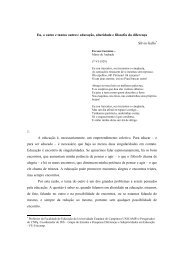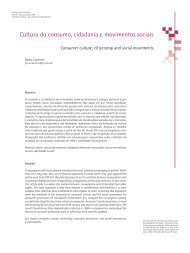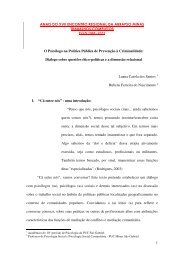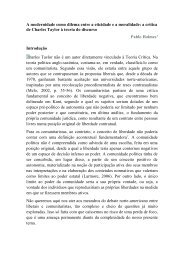Beyond
Beyond Good And Evil Marshall Rosenberg On Creating ... - The Sun
Beyond Good And Evil Marshall Rosenberg On Creating ... - The Sun
- No tags were found...
You also want an ePaper? Increase the reach of your titles
YUMPU automatically turns print PDFs into web optimized ePapers that Google loves.
step is for the woman to express whatever it is that she wantsher attacker to understand. Now, this woman has suffered almostevery day for years since the attack, so what comes out ispretty brutal: “You monster! I’d like to kill you!” and so forth.What I do then is help the prisoner to connect with thepain that is alive in this woman as a result of his actions. Usuallywhat he wants to do is apologize. But I tell him apology istoo cheap, too easy. I want him to repeat back what he hearsher saying. How has her life been affected? When he can’t repeatit, I play his role. I tell her I hear the pain behind all ofthe screams and shouting. I get him to see that the rage is onthe surface, but beneath that lies the despair about whetherher life will ever be the same again. And then I get the manto repeat what I’ve said. It may take three, or four, or five tries,but finally he hears the other person. Already at this point youcan see the healing starting to take place — when the victimgets empathy.en I ask the man to tell me what’s going on inside ofhim. How does he feel? Usually, again, he wants to apologize.He wants to say, “I’m a rat. I’m dirt.” And again I get him todig deeper. And it’s very scary for these men. ey’re not usedto dealing with feelings, let alone experiencing the horror ofwhat it feels like to have caused another human being suchpain.When we’ve gotten past these first two steps, very oftenthe victim screams, “How could you?” She’s hungry to understandwhat would cause another person to do such a thing.Unfortunately, most of the victims I’ve worked with have beenencouraged from the very beginning by well-meaning peopleto forgive their attackers. ese people explain that the rapistmust have been suffering and probably had a bad childhood.And the victim does try to forgive, but this doesn’t help much.Forgiveness reached without first taking these other steps isjust superficial. It suppresses the pain.Once the woman has received some empathy, however,she wants to know what was going on in this man when hecommitted this act. I help the perpetrator go back to the momentof the act and identify what he was feeling, what needswere contributing to his actions.e last step is to ask whether there is something more thevictim would like the perpetrator to do, to bring things backto a state of peace. For example, she may want medical billsto be paid, or she may want some emotional restitution. Butonce there’s empathy on both sides, it’s amazing how quicklythey start to care about one another’s well-being.Killian: What kinds of “needs” would cause a person torape another human being?Rosenberg: It has nothing to do with sex, of course. It hasto do with the tenderness that people don’t know how to getand often confuse with sex. In almost every case, the rapiststhemselves have been victims of some sort of sexual aggressionor physical abuse, and they want someone else to understandhow horrible it feels to be in this passive, weak role. ey needempathy, and they’ve employed a distorted means of gettingit: by inflicting similar pain on someone else. But the need isuniversal. All human beings have the same needs. ankfully,most of us meet them in ways that are not destructive to otherpeople and ourselves.Killian: We’ve long believed in the West that needs mustbe regulated and denied, but you’re suggesting the opposite:that needs must be recognized and fulfilled.Rosenberg: I’d say we teach people to misrepresent theirneeds. Rather than educating people to be conscious of theirneeds, we teach them to become addicted to ineffective strategiesfor meeting them. Consumerism makes people think thattheir needs will be met by owning a certain item. We teachpeople that revenge is a need, when in fact it’s a flawed strategy.Retributive justice itself is a poor strategy. Mixed in withall that is a belief in competition, that we can get our needsmet only at other people’s expense. Not only that, but that it’sheroic and joyful to win, to defeat someone else.So it’s very important to differentiate needs from strategiesand to get people to see that any strategy that meets yourneeds at someone else’s expense is not meeting all your needs.Because anytime you behave in a way that’s harmful to others,you end up hurting yourself. As philosopher Elbert HubbardAll human beings havethe same needs. when ourconsciousness is focused onwhat’s alive in us, we neversee an alien being in frontof us. other people may havedifferent strategies formeeting their needs, butthey are not aliens.once said, “We’re not punished for our sins, but by them.”Whether I’m working with drug addicts in Bogotá, Colombia,or with alcoholics in the United States, or with sex offendersin prisons, I always start by making it clear to them thatI’m not there to make them stop what they’re doing. “Othershave tried,” I say. “You’ve probably tried yourself, and it hasn’tworked.” I tell them I’m there to help them get clear about whatneeds are being met by this behavior. And once we have gottenclear on what their needs are, I teach them to find moreeffective and less costly ways of meeting those needs.(end of excerpt)February 2003 e Sun 7













